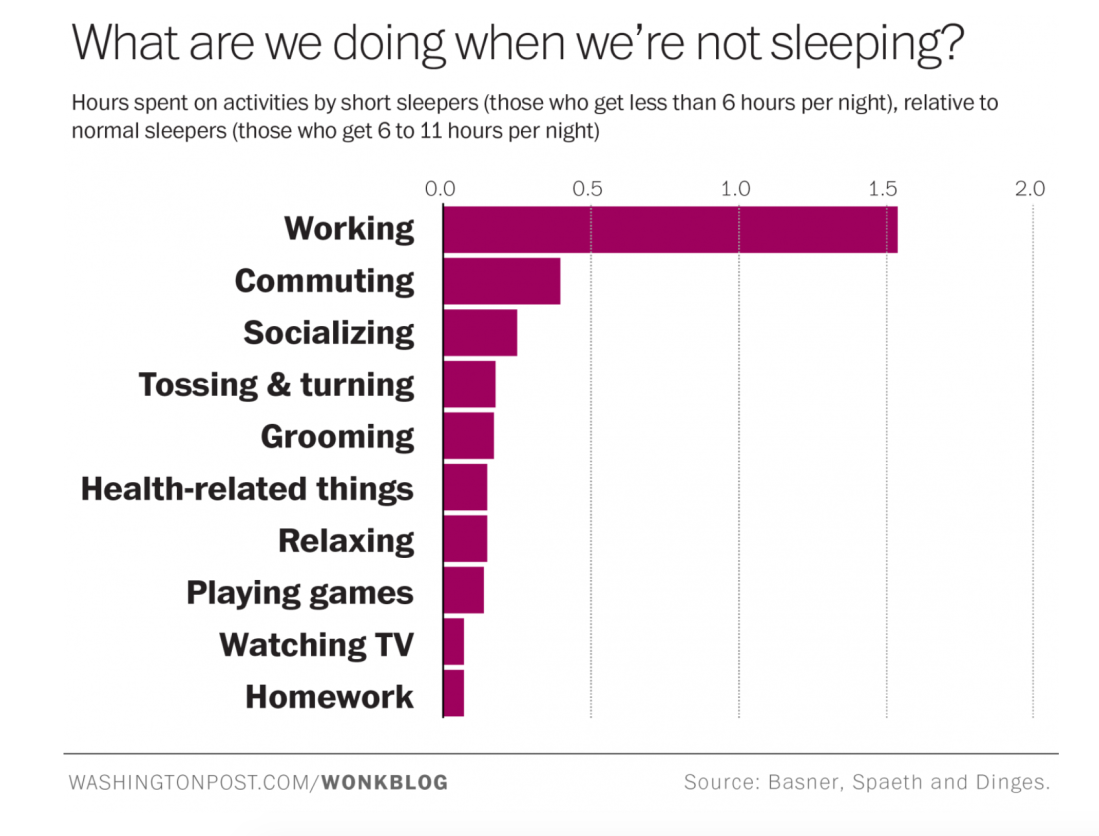Society has now created an even greater divide between the rich and the poor. In fact the division is so great it is putting pressure on lower income households to work more and is depriving them of the most important ingredient to a healthy life; sleep. Sleep is becoming the new commodity sought after by the rich and pleaded for by the poor. Ironically even though sleep is free, it does not come cheap.
Unsurprisingly, data from the Centre for Disease Control shows that those living below the poverty line are more likely to average less than six hours of sleep per night (C.E.S., 2017). This is cutting the amount of sleep needed for a regular adult by two hours, as the National Sleep Foundation recommends seven to nine hours of sleep per day. Younger age groups require more sleep as their bodies and brains are still developing (Deutsch, 2015)
The Centre for Disease Control did not give reasoning as to why lower income households gain less sleep but contributing factors suggest that it would be due to not being able to afford housing in a quieter neighbourhood, long morning and evening commutes and having to work longer hours and more jobs.
Not only does lack of sleep reduce productivity and concentration of individuals but it also creates dire health concerns. Harvard’s school of public health has found a major link between sleep and obesity. Sleep deprivation has been linked to obesity as the individual is more likely to be too tired to exercise and may take in more calories than needed because they have more opportunities to eat; lack of sleep also disrupts the balance of hormones that controls appetite, if you are sleep deprived you will be hungrier than those who have been sleeping soundly each night (Harvard, 2017). Harvard’s school of public health found that cutting sleep by as much as two hours increased chances of obesity by 15%. Sleep deprived people are also more likely to suffer from hypertension, diabetes, depression, cancer and increased mortality.
 Hiltner, 2017.
Hiltner, 2017.
Interestingly, lack of sleep in poorer families also affects children within these families. The American Psychological Association has found that social class has moderated the link between children’s sleep and cognitive functioning on standardized ability tests. Children of middle and lower social economic status had parallel performance when sleep was ideal, when sleep was deprived, lower social economic status children’s cognitive performance withered.
The American Academy of Sleep Medicine has stated, “ A new study shoes that paid work time is the primary waking activity exchanged for sleep.” Data shows that compared to normal sleepers, short sleepers reported sleeping 6 hours or less worked 1.55 hours more on weekdays and 1.86 more hours on weekends or holidays.
 Data provided by the Washington Post explaining our non sleeping time activities.
Data provided by the Washington Post explaining our non sleeping time activities.
Unfortunately the trend of sleeping less and working longer will unlikely change anytime soon due to income inequality which is sadly an element of our society that is ingrained in history. Only time will tell, will we work ourselves to death?
A.A.o.S. 2014, Many US workers are sacrificing sleep for work hours, long commutes, viewed 19 October 2017, <https://www.eurekalert.org/pub_releases/2014-12/aaos-muw121114.php>.
Centre of Disease Control. 2017, Percentage of Adults Who Average ≤6 Hours of Sleep,* by Family Income Group, viewed 19th October 2017, <https://www.cdc.gov/mmwr/preview/mmwrhtml/mm6412a10.htm?s_cid=mm6412a10_e>.
Deutsch, L. 2015, viewed 19 October 2017, <https://www.usatoday.com/story/news/nation-now/2015/02/03/sleep-duration-recommendations/22790433/>.
Harvard. 2017, Sleep Deprivation and Obesity, viewed 19 October 2017, <https://www.hsph.harvard.edu/nutritionsource/sleep/>.
Hiltner, S. 2017, Will Shortz: A Profile of a Lifelong Puzzle Master, viewed Octover 19 2017, <https://www.nytimes.com/2017/08/01/insider/will-shortz-a-profile-of-a-lifelong-puzzle-master.html>.
Ingraham, C. 2014, Americans are trading sleep for work, and it’s literally killing us, viewed October 19 2017, <https://www.washingtonpost.com/news/wonk/wp/2014/12/15/americans-are-trading-sleep-for-work-and-its-literally-killing-us/?utm_term=.f6c633346ede>.
Sleep and poverty 2013, viewed 19 October 2017, <http://www.apa.org/pi/ses/resources/indicator/2013/11/sleep-poverty.aspx>.
the link between lower income and less sleep is interesting yet unsurprising, your links to the detrimental health effects are similar to what I discuss in my literature review. Why we sleep and how we sleep are very much related!
LikeLike
An interesting question you left with. For my future self, I hope not! I think we need technologies in the future that will help us find the right balance between work, sleep and play – like my prototype Shush does.
LikeLike